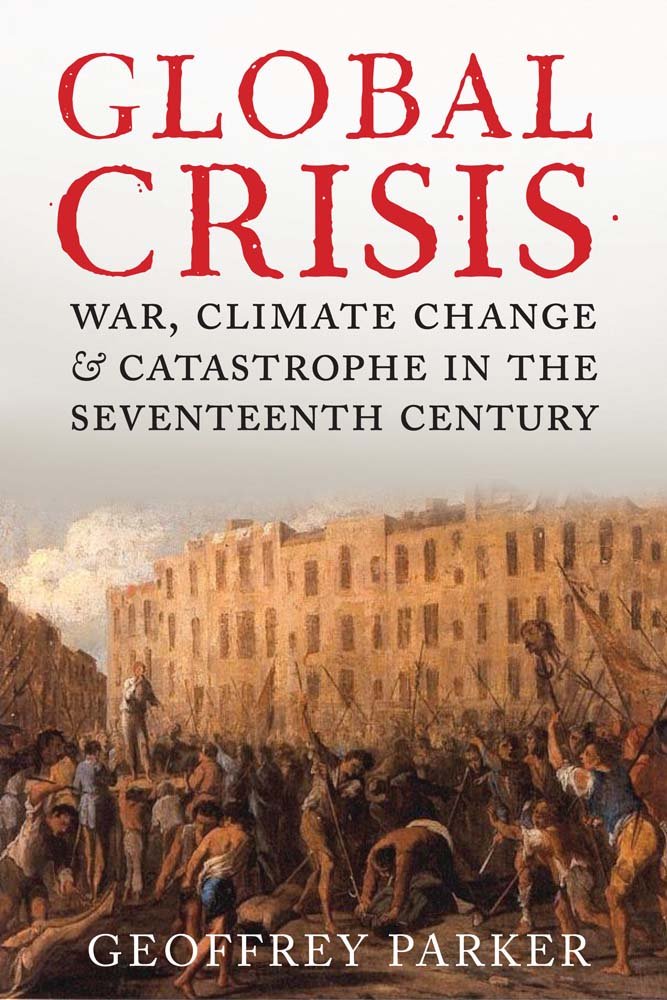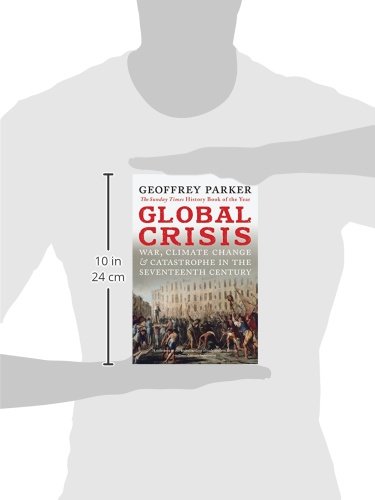


Full description not available
E**N
Major work of history
This is a great work; it will stand as a major history of human beings dealing with multiple crises. I have to disagree with those who say it's "not for the beach" just because it's long. It is so well and compellingly written that it served me well on a long vacation. Infinitely better than those horrible long novels people take with them.My one problem is that Dr. Parker does not really prove a case that climate caused the revolutions and wars. He stops a bit short of saying it did. He correlates wars and rebellions with the horrible climate events of the Little Ice Age, but--in a particularly good section of the book--notes that the awful climate events continued well into the 18th century, but the wars didn't. In fact, the 18th century begat the Enlightenment, partly in reaction to all those wars in the 17th. So, in fact, climate problems sometimes go with wars and sometimes go with revolutions and sometimes with neither one. Not much hope of causal chains there.In some cases, the wars were predictable long before the climate turned bad. The Ming Dynasty's survival till 1644 was a still-unexplained miracle; it was rotten and tottering by 1550 (or even 1500) and would surely have fallen in the 17th century, climate or no. The religious wars of Europe were also a long time coming; they started in the 1200s with the Albigensian Crusade and got steadily more serious as Protestantism appeared. The climax in the 17th century was fairly predictable.So, how much does climate explain? It certainly made people more desperate. It certainly displaced millions, and displaced people have much less vested interest in peace than stably located ones. We will need a lot more studies.Of course, Parker is writing with an eye to our current period of rapid climatic change. I expect that we will see either lots of wars or lots of action to stop climate change. Possibly both. Dr. Parker provides a scary scenario of what might happen (again).
R**C
It's about natural climate change...!
Comprehensive and very readable, Global Crisis has kept me interested and filled countless gaps in my knowledge. It was way past time that there was at least an attempt to combine the political, economic and climate histories of an era, specially one as turbulent as the 17th century. And although I am not an expert on history, I think that Geoffrey Parker has done a terrific job.Although it is tempting to draw close parallels with the political machinations of that era with those of today, I believe that to do so is rather facile in the influences are vastly different. However, the way sudden changes in climate, and I mean the natural changes that come from perturbations in the earth's movement around the sun, sun spots, and various other natural phenomena can influence world politics is a real caution. It should also signal that current changes in world climate are more likely to be "natural" than man-induced.The various reasons given for the appalling consequences of changes in climate during that era...mainly the wrath of whichever God was paramount in their particular societies, is an interesting parallel to the current fixation on that natural gas CO2.All in all a very worth while read.
L**E
correlation vs causality
This book tells the story of the 17th century with its chaos, famine, revolutions, harsh weather and wars, and does in an all-encompassing look across the globe.Much of this story has been told before either in works focusing on individual areas, or as a whole.The premise underlying this retelling is that harsh and unusual weather/climate had a greater role in triggering the political upheaval than heretofore appreciated.There is no doubt that the climate was severe based on historical records and observations, and that it resulted in famine, population decrease etc.It's a little less clear to what extent the climate triggered the political events. The author interjects the climatic variables into the historical story and suggests they played a role but at times it's not clear whether the climatic effects were causal, correlated, or simply co-existed.So we hear that cold, heat, drought, floods played into the historical events, but in some instances they are interjected into the currency of the events, which is no more meaningful than to acknowledge that while the unusually early and cold winter halted Napolean's and Hitler's attempt to conquer Russia, that the winters were in any way causal of their invasions rather than correlated or co-existent.In most cases the author attempts to find and indicate causality but the lines do get blurred as to what was causal or coincidental, as the book repeatedly interject into the narrative that 'it was the coldest, hottest, driest, wettest' etc,; points out the disruption and famine that was undoubtedly caused by these changes and infers theeir connections as causative cause rather than an harsh but co-existent modifier of the events.When climate change was not associated with massive unrest (Japan e.g) the author relates that to a better organized government and less pressure on the food supply among other explanations...which seems to try to have the climate stor both ways, although those mitigating effects may indeed by true.It's a historian's prerogative to build and 'theme' the root causes of historical events... The historical events happen once but can have many interpretations... a la the dozens of books written about the precedents for say, the attack on Pearl Harbor or the causes of WWII.I don't give the book less than 5 stars because of the thesis relating to the climate...it's a little dense and dry at times to read as it covers the events of the century, and begins to get a bit repetitive..Overall, it's a good account of the travails of that century with an interesting theme that has much to support the premise of induction by climate...but if you've read about the chaos of the 17th century in any other book you won't get much more out of this than 'it was the coldest, hottest, driest, wettest, drought stricken, volcano inflicted' etc interjections, and you can add them yourself to your other readings, as they did occur.... but what they caused and with what they simply coincided or exacerbated is hard to tell.The author may have been better placed to focus on the exacerbation of the events by climate rather than reaching to causality...but it wouldn't have been such a provocative new approach...which he is entitled to venture...
S**K
amazingly informative
So far I've been dipping between reading the epilogue and starting at the beginning. So far some very compelling arguments presented on the effect of climate on human behaviour in the broad. As a fiction author with a thirst for accuracy, I've been logging the weather from various sources in my usual period, 1775-1820 in Britain which is enough of a challenge, and wondering how much effect the climate change of the Dalton Minimum had, and I am now inclined to consider looking at it more closely.Having recently been studying Polish history to follow up a wild interest in winged hussars, I bought this book which was recommended by a friend, and it is a tremendous help, and explains a passage in Henryk Sienkiewicz's novel 'Potop' in which King Jan II Kazimierz Wasa makes the famous Lwów oath in April when there is hard frost. That this is a world-wide study is mind-blowing and I salute the author for dedication and scholarship.
V**R
Une nouvelle histoire de la crise du 17ème siècle
Geoffrey Parker,mondialement connu pour la thématique sur la Révolution Militaire, aborde ici un nouveau thème mettant en perspective les évolutions, politiques, économiques et militaires dans ce que l'on appelle la crise du 17ème siècle. Le petit âge glaciaire a sévi plusieurs pays du globe et l'auteur montre avec brio l'impact du climat, et des événements naturels. C'est un livre avec de nombreuses références et qui n'est pas centré seulement sur l'Europe. Geoffrey Parker aborde le thème de façon mondiale en tenant compte des recherches menées depuis une dizaine d'années et indiquant par ailleurs les vides subsistants ainsi que les axes à approfondir. C'est un excellent livre d'histoire qui se lit très bien
P**S
Although very interesting and often reading like today's news
Although very interesting and often reading like today's news....it was far too long a saga......just skipped the last 2 chapters
R**B
Exhaustive compelling history
Thought I was a student of history until reading this book - 3/4 the way through 800+ pages. The scholarship and attention to detail is staggering. Will have to go through again and take notes. Covers every continent and culture and major event of the 1600's including climate. Lives up to it's title.
R**G
An essential read for any History buff
The scope of this book is quite extraordinary and the scholarship involved somewhat intimidating. A detailed insight into events that few appear to be aware of but which have contributed to shaping the world we live in. There are lessons to be learned for the survival of mankind but whether they will be observed is open to question. In spite of its length and the detail I found it an absorbing and easy read although I struggled with the pronunciation of Chinese and Japanese names. If your interest is in history and you are curious as to how we have managed to survive this long then you should read this book.
Trustpilot
3 weeks ago
1 week ago